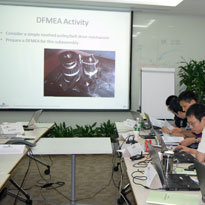Leading/Facilitating Root Cause Failure Analysis (RCFA)
- Course:Leading/Facilitating Root Cause Failure Analysis (RCFA)
- Course ID:RCFA-LEAD Duration:2 days Where: Your Office (7+ Persons)
- Download Course Description (PDF)
Available as a private, customized course for your group at your offices or ours and in some cases as a WebLive(TM) class.
Course Outline
Day 1
- RCFA Concepts
- RCFA philosophy and the four-step problem solving approach
- Troubleshooting vs. failure analysis
- Case Study: The Mast Mounted Sight
- Group Discussion: Current failure analysis challenges
- Role of the RCFA Leader
- Leadership, management, and motivation
- Situational leadership
- Instilling a sense of time-based urgency
- Incident resolution vs. more in-depth root cause failure analyses
- Keeping meetings short and maintaining analysis momentum
- Boots on the ground: Management By Wandering Around
- Assuring rapid root cause identification and corrective action
- Stress management
- Group discussion: Current leadership challenges
- Activity: Instilling a sense of urgency
- Selecting the Appropriate Analysis Approach
- Brainstorming, FMEA, mind-mapping, 5-Whys technique, Ishikawa diagrams, flow charting, and fault tree analysis reviews
- Matching the analysis approach to the failure analysis challenge
- Group discussion: Current analysis approach challenges
- Activity: Analysis approach selection
- The Failure Analysis Team
- Selecting an appropriate team
- Familiarity versus a fresh look
- Functional discipline participation
- Purchasing, Quality Assurance, Engineering, Operations, and Field Service contributions
- Activity: RCFA team member selection
- Developing an Action Plan
- Using Failure Mode Assessment and Assignment (FMA&A) matrices for analysis management
- Failure analysis meetings
- Addressing action item delinquencies
- Conquering analysis plateaus
- Activity: Preparation of an FMA&A
- Case Study Homework Assignment
Day 2
- Case Study Review
- Managing Potential Cause Evaluation
- What’s different, pedigree, and conformance analysis
- Basic metallurgical and electronic component evaluations
- Specialty technologies
- Welding, piping, pump, and leak failures
- Intermittent failures
- Integrating supplier inputs
- Commercial failure analysis laboratories
- Testing to confirm failure causes
- The RCFA/Design of Experiments relationship
- Activity: Updating the FMA&A
- Eliminating Recurring Failures
- Drilling down
- Overcoming the “we’re special” syndrome
- Overcoming ego
- Case studies
- Activity: Drilling deeper for elusive recurring failure causes
- Corrective and Preventive Action
- Corrective and preventive action definitions
- Corrective and preventive action order of precedence
- Using FMA&As for corrective and preventive action management
- Assessing risk
- Managing preventive action risk versus return
- Corrective and preventive action case studies
- Lessons Learned applications
- Activity: Selecting appropriate near- and long-term corrective and preventive actions
- Looking for Trouble: Proactive vs. Reactive Approaches
- Troubleshooting vs. Failure Analysis
- Troubleshooting definition
- Speed and accuracy: Obtaining meaningful results rapidly
- Using the fault tree and FMA&A to focus and prioritize troubleshooting
- Using the fault tree to expedite troubleshooting
- Activity: Streamlining troubleshooting and the RCFA investigation on a complex system failure
- Keeping Management Informed
- Progress reports
- FMA&A distribution
- A suggested failure analysis procedural
- A suggested failure analysis report format
- Defining Success
- Establishing success criteria as an integral RCFA component
- Monitoring corrective/preventive action efficacy
- Course Recap, Q/A, and Evaluations
Course in a Nutshell
In this 2-day workshop you will learn how to lead/facilitate root cause failure analysis efforts from a technical, organizational, and leadership perspective, helping you create teams that can work effectively together to eliminate intermittent, significant, and recurring failures. It will help your RCFA team leaders or facilitators acquire the critical skills they need to perform RCFA investigations with objectivity, accuracy, efficiency, and rapidity. We will show you how to avoid common pitfalls such as poor problem definition, ineffective solutions, ego-driven RCFA ineptitude, languishing failure analysis activities, and repeatedly having to solve the same problems.
Customize It!
- Focus the course on failure prevention, cause determination, or both.
- Exercises and case studies can be tailored to your industry and organization.
- Day 2 can be turned into a workshop that allows the participants to analyze failures specific to your organization under the guidance of a seasoned RCFA investigation leader. The two training days can be scheduled a few weeks apart to give the participants time to apply on their jobs the techniques taught on Day 1 before returning to the problem-solving session of Day 2.
- The course can also be taught, if needed, as an intensive 1-day interactive-lecture. The abbreviated version leaves out some of the topics as well as the exercises and case studies included in the 2-day version.
- Schedule a post-class consultation for helping troubleshoot and guide your organization’s ongoing RCFA efforts.
Learn How To
- Effectively lead a multi-disciplinary team to resolve complex system failures.
- Coordinate interdisciplinary and inter-company activities to rapidly identify and objectively evaluate potential failure causes.
- Match the analysis technique to the failure to assure rapid and effective corrective and preventive action implementation.
- Eliminate recurring failures.
Aimed At
This course is aimed at engineers and others who lead or facilitate root cause failure investigations.
Prerequisites
An engineering, scientific, or technical background along with an understanding of the RCFA techniques that can be acquired by taking a course such as:
- “Five out of five. Course content and participant handbook very good. Excellent explanations connected with the work experience. Examples very engaging! - Jackie Haggarty, Control Specialist, Spectra Energy

